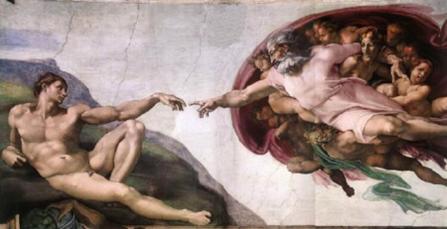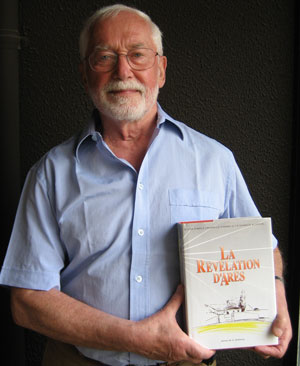
| august 6, 2007
(0065us) god? |
 Such
misrepresentations of
God have demonstrated the incapability of religion to escape from
primitivity and superstition and
keep atheism from spreading. What’s more, here (Sixtine Chapel,
Michael-Angelo, Vatican) we wonder whether God is creating Adam or Adam
creating God. Such
misrepresentations of
God have demonstrated the incapability of religion to escape from
primitivity and superstition and
keep atheism from spreading. What’s more, here (Sixtine Chapel,
Michael-Angelo, Vatican) we wonder whether God is creating Adam or Adam
creating God.In 1974, somebody speaks to me through Jesus (2/15). In 1977, somebody—he introduces himself as the Return (I/1), so he can't not be but the same—speaks to me directly; it'll be thirty years come October. Somebody that has fathered all of Earth, all of life, all of man (4/10) and even the universe (12/4, not to mention his fatherhood over me reduced to nothing by him (40/6) so as to cleanse my heart (L/1) ! Somebody that doesn't trouble himself about being mistaken for anyone else, at all, so that he names himself simply I or Me (2/13, XXXVIII/3, etc.). This is God, yes...and no. Whenever human words emerge, notably the word God, all gets into a muddle: Jesus was made a God (2/13), but he is not God (32/2), and then all turns vaguer… This a Christ who is God born to Jesus, which, when taken literally, sounds as if it meant that God sprang from the imagination of a man, Jesus, born to a woman called Mary (32/2). Indeed, these words have quite another meaning, which man's spiritual intelligence reduced to a dull candle end, cannot understand (32/5). Sensible, therefore, were the early Christians as they used to know by intuition that Jesus had got something to do with God, but to see to it that it remained an intuition. Senseless, accordingly, was the church as it changed the intuition, where the Truth could swim, into a dogma—the trinity (23/7, XVIII/1), the redeeming cross (XXXI/1) —, where the Truth has been a wreck awaiting refloating. The refloater, The Revelation of Arès, has come in. If the church, which was God's grand crop (14/3-4) before God began getting in the Arès Pilgrim harvest, can hear the Call (4/4) and doing so it will take to slowly pulling up to the surface the intuition, the faith of Abraham, of Jesus, the faith in the Good (XXXIII/1) and its maidservant: beauty of words and actions (12/3). We believe that the Creator did not speak to no avail in Arès, and that religion is to open up somehow or other to the thousand suns of the Breath that melt (2/14) the obscure dogmatic language (2/14) into an intelligent language (23/4), the Life that for the time being is still hiding beneath the desert of words (24/3-5). The very concept of God, which most men keep on disproving, is in the greatest need of refloating. Meanwhile, we'll see below that it is not always an error to say that God is a product of imagination, but that for all that God is no less real. Until
1974 I couldn't imagine being unaware of what and
who God was.
But ever since I was given The
Revelation of Ares I've been broadly unaware of it. All I
know
now, using my poor spiritual loaf
(32/5), is some things he says like: Truth is that
the world
has to change
(28/7), and some things he makes like to love man
too much
(12/7) and
create the universe uninterruptedly: I
(am still) run(ning and while running) I make a thousand new suns
(XXII/12), but I suspect he is and can make and can give us a
lot more.
The
Revelation of Ares often says
God with the religious pomposo or a skeptical sotto voce, so as to
reproach us for blathering about God . We can easily understand why The
Revelation of Arès likes the
term Father better: Father of
the universe, You are
the only
Saint (12/4). God sometimes refers to himself as I
have, I am
(II/1)… it is I who is speaking (XLVIII/3),
which are good matches for "You
shall tell tehm that I-am sends me to you (Exodus 3/14)."
Some
people ask me, "Where in his Word has I-have-I-am
put the list of all he has and all he is, so that we may definitely
identify him?" I reply, "There is no list, because the Father
as
an absolute owner and
being has and is absolutely." The reply, I know, sounds like
argumentation rather than insight. It is a reminder of the ontological
or teleological arguments of the theists and deists. For instance, this
argument as flimsy and barren as it is famous: "God exists, because he
is necessary," which I thought was false in the days when I was an
atheist Communist, and then true after I converted to Christianity
around 1962, and which I think now is both true and false, as God has
become necessary to me, since I saw
him (37/3), but has remained
unnecessary to those in large numbers who contend that I must have seen
things.As regards atheist Communists, lately my children recalled me as a young man being fond of René Char (a French poet who died lately) and gave me his complete works (La Pléiade) as a present for my 78th birthday. When I find time to reread Char again, I will for sure find his professions of atheism, which I used to share. This I can quote from memory: "Men have cooked God up and garnished him—rather badly, he added—with their human phantasms." Atheistic Char was a great poet, however, he had intelligence and sensitivity of high quality, living proof that an individual can be a good man, even though he does not recognize the Voice of God (28/1-12). Heidegger and Sartre, whose existentialism The Revelation of Arès has decisively added its own existentialism, were they atheists? "Yes," a priest, a pastor, a rabbi, an imam would answer. "No," an Arès Pilgrim answers. Heidegger and Sartre disproved the God of religion, but The Revelation of Ares, which is nothing atheistic, not by a long way, disproves the God of religion even more. Heidegger mentioned a reality ultimate, but reachable, the Being. Sartre, even though he considered the concept of a God as the ruler of man and his destiny as impossible, because it denies man's free will, which is quite obvious, would not have disowned the God that insists on man's obvious free will, when he says, "Adam chose… (2/1-5)." Neither is The Revelation of Arès at variance with Sartre's idea that essence cannot have been created before existence—"Existence comes before Essence"—, because a man can at any time decide on his "fundamental project," which for us Arès Pilgrims is individual as well as worldly salvation, and can even "decide on his own character," which we Arès Pilgrims strive to do through penitence. Hegel said—in his "Little Logic," I think—that the finity of things and beings is that their existences are distinguishable from their notions, but as regard God his notion and his being are inseparable. By this, I think, you can tell God and you can tell God by this in man himself. Hegel did not produce proof of God, but he gave what I believe is the right way of spotting him, his right image (Genesis 1/26-27), the indivisible Whole which God's being and thinking make up, the whole that a penitent recovers while recovering the image of his or her Maker. It culminates in God's being experience. God is experience for me, the witness of The Revelation of Ares, but he has been, he is, he will be experience for a lot of people in a lot of ways, whether prodigious or very private. The snag is that most of those people have kept their experiences hidden (2/16-18) from a world ruled by psycho-socio-political received ideas where free speech about God is considered as "totally irresponsable" and "unbearable" as free speech about love between men or absolute freedom. This is why The Revelation of Ares states in substance that it doesn't matter whether you fail to prove God, because the objective is Good. Besides, whoever seeks Good seeks God, even unconsciously. The Arès Pilgrims seek Good through penitence, but apart from them myriad people pay no attention to it and the believers among these people do not even realize that so doing they have got more than dangerous gaps in their knowledge of God, they live in emptiness—Hence a need of the theater of religion in order to fill emptiness and men's anxiety before the emptiness of death— It's pointless explaining and proving God to people who ignore Good. The small remnant of penitents who are harvesting new penitents cannot carry out their mission, if they are not testing people for their interest in Good. Only later will they grow conscious of God and still later will they get knowledge of God. |
| Comments posted
(np)
Add a comment |
| july 24, 2007
(0064us) ad |
In
Bordeaux,
France, close to the courthouse, you could a short while ago have seen,
on the wall of an old apartment building, a monumental portrait of
Montesquieu underlined with a quotation by this important
person
about prejudices as wanton assumptions and roots of all error. By some
irony of chance, advertising, which is one of the major vehicles of
prejudice ever devised by man, has covered Montesquieu's portrait with
a huge advertising poster telling people they are in for "a very
special location at hand to live a new art of life." That
dream apartment building to
come may have its uses,
but if it is
of use, why advertise it? The question had led me to ponder
advertising, not only real estate advertising, but advertising for
everything everywhere, that substitutes the tempting for the useful,
because in this the problem lies, in the hyperbole. People free from
worries and shame find themselves laden with worries and shame, when
they are over-indebted for something that they out of prejudice, into
which hyperbolic advertising leads, had thought could have transfigured
their lives. That
dream apartment building to
come may have its uses,
but if it is
of use, why advertise it? The question had led me to ponder
advertising, not only real estate advertising, but advertising for
everything everywhere, that substitutes the tempting for the useful,
because in this the problem lies, in the hyperbole. People free from
worries and shame find themselves laden with worries and shame, when
they are over-indebted for something that they out of prejudice, into
which hyperbolic advertising leads, had thought could have transfigured
their lives.I know that, if non-essentials and luxuries were suddenly taken off the market, 50% to 75% of industry, and of employment therefore, would be wiped out straightaway. That's the big snag of our current type of economy, which only spiritual life will make up for through a natural change of logic and natural transfer of values and desires. Meanwhile, is it wrong to find faults with advertising? The
overall
goods which ads prompt people to buy are beyond their means.
Otherwise
ads would not be necessary. Disproportion between the global amount of
supply and the global amount of the means makes temptation break up,
get pulverized into millions of buying particles, which makes us forget
about disproportion but does not make it disappear. Ads only address
the poor, because the wealthy are way too scarce to account for
enormous advertising budgets, and the wealthy know whatever they want
simply because they can get it.
Not
only are ads hyperbolic, but they
are numberless. As a
real estate
special offer ad had erased the portrait of Montesquieu, or
intelligence, I focused my attention on advertising as a whole for a
few days. Ad(vertising) is swarming, so it is bound to cloud myriad
minds. You
think that you have long stopped descrying it, but it is there,
numberless spots and marks, each in its frame, its poster, its rolling
ads display, let alone its yellow page, its web page. It is there like
a jewel in its box, like a pretty model or a handsome athlete in his or
her tight-fitting underwear, telling you that it is you that he or she
has thought of night and day, it is you that he or she has been waiting
for. The great advances made in color printing and photography make
those temptations virtually touchable, so that the people that covet
them might be virtual rapists. The poor buyer takes leave of his
senses. Suddenly overcome with senseless self-confidence, he will get
into debt, or even steal…The consecutive instability and disappointment
make men suffer much more than you can imagine.
We
Arès
Pilgrims have a lot to do to make men conscious that real beauty
(Rev of Ares 12/3)
is not that which ad praises. |
| Comments posted
(np)
Add a comment |
| july 10, 2007
(0063us) what to hope for? |
|
The
Revelation of Ares does not distinguish between politics and
religion.
Now, politics and religion rule the world. No change adverse to their
designs stands a chance of becoming globally successful. What to hope
for, then? The princes (a word that often crops up in The Revelation of Arès) are those of the political worship and those of the religious worship alike. Contempt of papacy or contempt of presidency, one and the same magnicide. Political speeches as well as religious preaching may change their tunes, but the actions resulting from them have remained similar. Politics makes nothing but whatever the men who accept it or elect it would make without any need of politics, just as religion ratifies nothing but the mistakes, superstitions and simplistic expectations of the sinners who adopt it. Politics and religion have continually been the theater where before the people the rag robin hood, the braggart comforter and redresser of wrongs, plays as if he challenged the fat cats, to whom he actually has been born behind the scene. Politics and religion have lived on through the forever productive she-rats which the rats that pass the law (Rev of Ares XIX/24) have through the ages made in rat. Their priests of the church or of priests of politics of the left or the right or the center, vie with plans never really to be achieved, which people listen to with their ears politely turned to the loud-speakers, figuring, "If things could ever change, someone would have known it." Hence the millennia-old absence of cardinal revisions, the incorrigible inability to see things as they are, the pursuit of evil, of error, of lies, of the mediocre, the system tight cordoned off through which nothing new can pass. Nothing new and even less a change, whatever.  What
to hope for, then? The change
through each
individual. And within
the individual the change
through the only strength that has grown away
from the system. The strength, moreover perfectible, of the heart
and/or the soul, of the
willpower, the will to be a different man. This
is the highly existential Path
that The Revelation of Ares
points to. What
to hope for, then? The change
through each
individual. And within
the individual the change
through the only strength that has grown away
from the system. The strength, moreover perfectible, of the heart
and/or the soul, of the
willpower, the will to be a different man. This
is the highly existential Path
that The Revelation of Ares
points to.When you open The Revelation of Ares which, compared with millennia-old History, sounds as fresh after 33 years as it sounded in 1974, you first feel as if you were breaking the citadel of evil (Rev of Ares 13/7-8) open. You enthusiastically hop over from word to word just as if you were dismantling the wall of sin stone after stone, you dream of opening a wide hole, through which Heaven's sunshine would rush in like heavy rain, before the world and shouting out to man, "Escape!" And then you're brought down to earth. As to me, because Jesus during the night of January 14 to 15, 1974, had scanned me with sad love and compassion, I was soon aware that I was the one ill with sin. As to you, you may keep illusions about yourself for some more time before bending down feeling your own misery, but just like I did you will know that there is a great wall thicker and harder than politics and religion, and that it is your own sin. That is why whoever conquers his or her own sin does not need religion or politics any more, says The Revelation of Ares. For all that, once the citadel of evil has vanished around the penitent, he or she does not see the world as more inclined to penitence, so he or she doubts again whether keeping high hope is sensible. The masses have hoped for so many paradises which never opened that they have stopped believing in God or a new world. What's more, no belief in anything fuels conversation, makes people sound serious. If to be an exception somebody still has some belief, but wants to look consistent, he at the very least has to talk about the Himalayas and even look more or less junkie, so that his madness may sound rational and be forgiven. Otherwise, he is "a victim of a sect." Nowadays very few humans go to Rome and climb the steps to st-Peter basilica, and once back home they keep from talking of their pilgrimage. Even the nuns only confide in the walls of their empty convents about it. Men have made secrets of their private hopes so much so that all of their hopes have subsided. This was the kind of world I became aware of in 1975 when I started missionizing street people, a spiritually dead world. It was paradox that I gained hope when responding to that idea of spiritual death, after I had blown out the wan oil lamps, the protective delusions, of the gilded icons of my church, and entered into penitence, begun applying goodness, I a man who had been spiritually dead alike—At the time men of religion called me a blasphemer, a fraud; they should think over the world's spiritual death instead—I started preaching through a universe which looked to me as if it was devoid of sun and moon, neither diurnal or nocturnal, nonexistent just as man looks nonexistent to you when you find out that what makes him different from animals is the spiritual, but that the spiritual has been annihilated (Rev of Ares 4/4). Once my hope was resurrected by penitence, I knew that the once annihilated spiritual could be restored to life within any individual. The possibility of this rebirth is growing more obvious when your own penitence is growing and bringing back into your heart the Sanctity, the Power and the Light (Rev of Ares 12/4) and enabling your soul to hatch. |
| Comments posted
(np)
Add a comment |
| june 25, 2007
(0062us) the Arès pilgrimage (a duplication of #0031us) |
 After
leaving the
reception house the pilgrim walks right along the gallery up to the
"déchaussoir" (le room where pilgrims get unshod) where they put on a tunic
and leave their shoes or
sandals. Then they go through to the room where the Creator manifested
himself in 1977 (The Saint's Word House with a belltower) where he
prays or meditates freely. After
leaving the
reception house the pilgrim walks right along the gallery up to the
"déchaussoir" (le room where pilgrims get unshod) where they put on a tunic
and leave their shoes or
sandals. Then they go through to the room where the Creator manifested
himself in 1977 (The Saint's Word House with a belltower) where he
prays or meditates freely.Every summer in Arès, France (33740, Gironde), 46 avenue de la Liberation, from June 21 to July 4, from July 12 to 25 and from August 2 to 15. Opening of the Theophanic place (where the Maker manifested in 1977): on Friday, 08:30 am to 11:30 am, on Saturday, on Sunday, on July 14 and August 15 (except when they fall on a Friday) 05:30 pm to 09:00 pm, on other days, 06:00 pm to 09:00 pm. Every pilgrim prays and/or meditates freely without disturbing the others. Who goes in pilgrimage to Arès? First of all people at the age of free (Rév of Arès 10/10) conscience, who have welcomed the Word (Bible, Quran), who know their recalcitrance to and infringement of Good, that is, that is, who know good from evil, love from indifference and hatred, forgiveness from the spirit of judgement, (36/16), peace from conflict, spiritual intelligence (32/5) from intellectual intelligence, who have heard the Father's request and converted to The Revelation of Arès, the Light that dispels the darkness of religious interpretations, who have decided to stop sinning and enter upon penitence, that is, practice good and not act evil, in short, men of the time to come (Rev of Arès 30/13). But also anybody else, even a nonbeliever, provided that he does not come just out of curiosity, and that his visit makes sense, if he states his respect for The Revelation of Arès, the Bible and the Quran, and states that love of all men and forgiveness of all offenses constitute the key to global happiness. What does a pilgrim come for? He or she comes to take the Fire from the very Hand of the Maker, who manifested and spoke The Revelation of Arès on that very place in 1977, and who has never left it (I am here... Rev of Arès XLI/1-8, XLVIII/9). How to take the Fire? Every pilgrim goes about it in whatever way he conceives or feels deep down, provided it is a dignified and discreet one. Usually, a pilgrim strikes with his forehead (XLI/4) and kisses (his lip takes... XLVIII/9) the spot, marked with a plain elliptic wooden frame, where the central Light rose and stood on the five 1977 theophany days, and then he goes and sits down anywhere in the hall to kindle or rekindle, by praying and/or pondering, every reason he has and his willpower to bring humanity, first of all his own humanity, to recover its spiritual source (Rev of Arès 24/4). Why is each pilgrim advised to take off his or her shoes and put on a tunic? Whoever has no personal tunic can be lent one, if some tunics are being available. One takes one's shoes off just as Moses did where the Maker was to speak to him (Exodus 3/5). The tunic screens the sexes, the richness or cheapness of clothes, the fear of the judgement of others and generally the fears of all that makes people giggle or be impatient, which divides and breaks up society (Rev of Arès 10/13-14). The tunic, which will turn into the coot or kitoneth when used as one's shroud, is also a reminder that one has to die as long as a small remnant have not defeated sin (28/12). The pilgrim's thought: The Abrahamic religion by becoming judaism, christianity and islam has changed into noise substituting for God's Word in Jerusalem (Rev of Arès XLVII/2). Hence the Father's moving house to France. The loving Father (Rev of Arès 12/7), however, does not doom religion to hell (For all that don't gather that those men have met perdition... 16/2), but he is harshly critical of it. Notably, religion has distorted the concept of salvation. Religion has preached personal salvation, while in fact it is inseparable from global salvation. Religion has preached salvation as if it was dependent on Heaven's judgment, while in fact it depends only and existentially on man's behavior. Only penitence (the practice of Good and refusal to sin) saves and, just as the Father cannot live without his human creature, his son, no penitent gets saved if he or she does not strive (as far as his or her circumstances permit) to save other men, his or her brothers and sisters (Save! Do not judge! Rev of Ares 27/3). Each penitent is a harvester of penitents, as The Revelation of Arès says. The pilgrim deep down undertakes or re-undertakes to awaken spiritual life, that is, Good, in himself or herself as well as in others. One does not go to Arès to beg for a miracle, which occasionally happens to occur without being sought for, anyhow. Quite the contrary, one goes there to give himself as a miracle, the miracle of one's faith in the self-redeeming effort (penitence), which The Revelation of Ares calls on man to make. Any man can be made a God, just as Jesus was, only by setting his steps in the Steps of the Father (Rev of Ares 2/12-13). This spiritual rerooting is growing more and more necessary in the early 21th century. Problems, which man recently still thought had been left behind after the struggles, wars and hardships of the 20th century, are re-emerging ahead of him, whether social, political, economical or only human. The Father came back to speak to men by the end of the 20th century, because he was well aware that perils: rivalry, deception, hatred, violence and war, would be experienced again. The Creator came back to remind man that man is the Creator's image and likeness (Genesis 1/27) and therefore can generate his own grace, his own miracle, if he wants to. The pilgrim asserts that he wants to. If I had not seen the Pilgrimage to Arès re-open every year on June 21st ever since 1974, a feeling of failure might have eventually overcome me. For 32 years I have seen thousands and thousands of believers come to Arès filled with hope, but not hope of strengthening their faith. Those do not come back to Arès disappointed to fail to find "something fantastic" there and failing to admit that they had never put their faith in the spiritual properties of effort (penitence). Those are unwilling to understand that the one answerable for evil is man, but not God, and that they only make matters worse by leaving it up to a few ambitious powers to rule the world. I can also see numerous men elsewhere, jews, christians, muslims, humanists, who expected Good to establish itself on earth at last, and who now give up hope that the world could draw lessons from the horrendous 20th century, ever. I can see a lot of silly and unfair actions taken by the men that claim they are capable of ruling the world, in short, I can see so many things likely to bring crowds to think that evil is to remain strongest ineluctably. Yes, I would suffer from a terrible feeling of failure, if I couldn't go on Pilgrimage to Arès, the place where I reaffirm my faith and hope every year. I know that the world of tomorrow has already been born into the square foot where the stick of light rose and stood in 1977. Evil will never grow stronger than Good and will eventually be conquered. Violence, injustice, domination and despoliation will not stay perpetual. Yes, man will some day gain perpetual happiness. This is the profound meaning of the Arès Pilgrimage. |
| Comments posted
(np)
Add a comment |
| june 20, 2007
(0061us) france seeks...theworld seeks to change |
|
The
French have changed nothing on June 17th. The world has changed nothing so far, either. "What's more, the world could explode at any moment," Abdullah of Arabia states. In June the French are neutralizing the president that they elected in May. Apart from Alain Juppé [a former Premier and currently Ministre d'Etat] and a few others, the French re-elect the bulk of the French Parliament who, whether leftist or rightist, have so far done nothing really creative and decisive to transform a country in jeopardy, and it seems to me that nobody has realized it. The French keep on seeking for a policy which they will never find as long as the system keeps on being what it has been. Meanwhile, Abdullah of Arabia issues a statement which sounds to me like one of the utmost significance. He lets out a cry of alarm, which is a cry from the heart as well, about the tragic situation in the Middle East likely to spread all over the planet.  Abdullah,
currently on an official
visit in Europe, says (according to
newpapers), "I fear that the plights in my area degenerate into a
global explosion… Instability is worsening in Iraq, Lebanon, Palestine
— not to mention Darfur —. Those may be the primers for instability in
the whole world." Abdullah,
currently on an official
visit in Europe, says (according to
newpapers), "I fear that the plights in my area degenerate into a
global explosion… Instability is worsening in Iraq, Lebanon, Palestine
— not to mention Darfur —. Those may be the primers for instability in
the whole world."Although the events in France and those in the Middle East aren't alike, I draw a one and the same lesson from them. I figure that, based on the system mankind has maintained for millennia, it's no use searching for a change anyhow instrumental in giving the world peace and happiness. France has for years sought to escape socio-economic difficulties and dangers but ever since June 17th, despite the great expectations raised by rhetorics from March to June, 2007, it is even more likely to sink deeper into its difficult situation than get out of it. Outside France the entire world looks for exits to peace, progress and concord, but not only do the men who try to change the world for the better, like the Americans intervening in the Middle East, fail to change anything in the world, but they make poverty and tensions worse. The warning, which The Revelation of Arès sent out to men in 1974 and 1977, has never been so significant, because both religion and politics are jobs done by rivals, so that they continually end up fighting each other. As the world's big shots can never be prompted to get to good terms with each other based on love, forgiveness, willingness to listen to others, and not even be brought to some fresh general thinking without reservation, it's the small fry — me, you — who have to outflank them through personal inner action, which does not need any leader (Rev of Ares 16/1), or law, or money, or weapons. This action is just penitence, practiced on a humble individual scale. Penitence, when multiplied, is to have an unparalleled global effect, since it is to re-create the world. Through penitence alone the world will change (Rev of Ares 28/7)…change completely, says the Maker in substance. Don't lose heart, brothers! You feel like you were nondescript antibodies in the world's sick big flesh, but if you never lose your peace and courage in vain thought and despondency (13/8), you will conquer evil. Not that being given the right faith from The Revelation of Ares is unimportant, but there is something even more important, it makes every one of the men who enter into penitence (33/13) a re-creator of the world. |
| Comments posted
(np)
Add a comment |
| June 16, 2007
(0060us) The Revelation of Arès...the surge of the existential |
| The
Revelation
of Ares is ridiculed or ignored by all the men who figure
that
mankind knows everything
likely to be known. But The Revelation of Ares is the force for whoever will recover Life (24/5) by reviving that desert world of ours with absolute spiritual love (7/5, 12/7, 32/3), intelligence (32/5) and freedom (10/10). The Revelation of Ares is what inspires the Ares Pilgrims (see #0017us) with their specific faith and apostolate. That is both a truth and an understatement, though. The Revelation of Ares actually ought to be seen in its existential light. Worry (sometimes dread), complaint (sometimes moaning), disappointment (sometimes despair), suffering (sometimes torture or death), are the thorn hedges and barren rockslides (14/1) which have hurt and killed man since Adam preferred his own system (2/1-5) to the creative Force (VII/5). The 21th century's man is more aware of his problems, suffers from them still more, though. The Revelation of Ares has given the solution to them. Not a book by a thinker, an essayist or a philosopher, but a book issued from the initial supreme Destiny of the universe, the very Destiny that gave man freedom of good and evil. A book to join the great spiritual body that the Veda, the Bible and the Quran had belonged in. From the very moment when its first part was published, 1974, The Revelation of Ares showed the reasons why man's hardships have remained unconquered and been considered as inevitable and insolvable, which religion and her atheistic colleague politics, the powers and their laws, have nursed whether intentionally or unintentionally. The solution to it is plain, but requires the rebirth of the soul (17) or ha (XXXIX/5-11), the refloating of a daring, creative, apostolic vessel (or ship) (17/3, 18/1-4) not launched or consecrated by some religion or politics, but by no more than man's own hope. That vessel over the Sea that has for ages kept man parted from the happy world forgotten, to be rediscovered, The Revelation of Ares names after her crew, the small remnant. A small remnant of men and women (26/1, 29/2), believers or non-believers, who wilfully change their lives (30/11) by forcing themselves to be good, righteous, true, could possibly do without the system some day, regain inner absolute freedom, good, peace, intelligence, and then later on infinite extension of lifetime, which thus will become Life out of likeness to the Maker (Genesis 1/27-28). Living on within the world the small remnant, once they are many enough, will go as far as to change the world (28/7).  So
The Revelation of Ares
brings back into the world the only possible
recipe for victory over evil, essentially and inevitably a spiritual
victory, by no means religious or political or scientific. Why, given
this condition of
necessity, has The Revelation of
Ares stayed almost invisible to the
world so far? There are many causes for it, on which a blog can't
dwell, but here are the two main causes. First, the book has been
supernaturally revealed in a society where supernatural stories trigger
off laughter and shrugs of the shoulders. Second, it has appeared in a
time of disparagement and smear, of zapping and impatience, of an
endless pursuit of immediate effects and effortless results. The
Revelation of Ares is no difficult reading, but it emerged
profound in days of superficiality when man is used to cutting short
everything, even his concern for his own fate. So
The Revelation of Ares
brings back into the world the only possible
recipe for victory over evil, essentially and inevitably a spiritual
victory, by no means religious or political or scientific. Why, given
this condition of
necessity, has The Revelation of
Ares stayed almost invisible to the
world so far? There are many causes for it, on which a blog can't
dwell, but here are the two main causes. First, the book has been
supernaturally revealed in a society where supernatural stories trigger
off laughter and shrugs of the shoulders. Second, it has appeared in a
time of disparagement and smear, of zapping and impatience, of an
endless pursuit of immediate effects and effortless results. The
Revelation of Ares is no difficult reading, but it emerged
profound in days of superficiality when man is used to cutting short
everything, even his concern for his own fate.When the mockers finish mocking, a fact will stay on, a once seen and heard physical fact, a fact that the pigheaded doubters, often religious people whose theologies will be thwarted, will forever keep unable to prove untrue. As I was the only witness they say I was under delusion, but had there been twenty witnesses, they would say they were under collective delusion, and had the supernatural fact been filmed, they would allude to special visual effects, and so on. In Ares (spelled with an e grave in French: Arès), a small town in coastal Gironde, southwestern France, from January 15 to April 13, 1974, I was visited by Jesus altogether unlooked-for and in a place no less unexpected: a house under repair. He gave me a long message from the Maker. And then, from September 17 to November 22, 1977, the Maker himself in a chapel close by was manifesting and giving me the continuation of the message in an utter continuity of meaning, but a completely different style. In 1982, after a five-year uneventful span of time, as it seemed to me likely that the supernatural fact was really over, I published my testimony under the title The Revelation of Ares. Thirty-three years after Jesus' first visit I am still unaware of the reason why a man like me of little merit, deprived of mysticity and deficient in personal abilities to spread such a message, was selected as the witness to that Call. Among all of the Scriptures that have made up the Creator's huge revelation ever since Genesis only a few have an outstanding globality. The Revelation of Ares belongs among them. It can join the Veda, the Bible and the Quran; it can even, in a way, be placed above these millennia-old books, because it illuminates them with a long forgotten Light. Stating that it amends their interpetations would be beneath it, as it actually animates or rather reanimates them with the very strongest Life. The Revelation of Ares does not ruin anything; it makes Truth move ahead. If you skim through The Revelation of Ares, you seem to be reading religious reiterations, but if you grow more alert, you begin discovering its amazing original and global sides. The reader passes through a forest of concepts, which are just so many mini-revelations, some of them fascinating when read apart, but the utmost meaning of the book is not understood until The Revelation of Ares has been read throughout. Salvation, personal and global, the solution to evil, is in the penitent's penitence and nowhere else. Religion has distorted penitence into remorse and self-punishment, but The Revelation of Ares restores penitence, a word long gone forbidding, to its real meaning, a thrilling dynamic one: the quest for Good and happiness. Evil can be curbed and then eradicated (the Beast will lay dying 22/14), if absolute Good reappears gradually through love, forgiveness, peace, absolutely wanted and applied by every man and woman of the small remnant in his or her absolute freedom (10/10) also gained with a will, for without absolute freedom his or her absolute spiritual intelligence (32/5) cannot re-emerge. Each penitent is also a harvester, looks for and reaps every man sown (6/1, 14/1) in seed of Good and prompts him or her to be a penitent and harvester in his or her turn, and so on, little by little, the world will be changing (28/7). So The Revelation of Ares brings about an apostolate or prophetic mission active, creative, patient (it will take more than four generations 24/2). The process is likely to last centuries, but it secures light and warmth (33/32) and even glory (37/9) in the afterlife for every good man, whether a believer or a nonbeliever (28/11). So a world of free individuals may be gradually substituting for the world of the masses until the Day (31/8) when even death will be conquered. The Revelation of Ares has inspired thousands to change their lives (30/11), become good men and new men, which religion or ethics could not make of them. On the other hand, like every Scripture, which keeps its mystery, The Revelation of Ares has inclined other people to misinterpret it, but even these mistakes have helped diffuse it through reductive conclusions and hodgepodges and innuendos about its witness's "unhingement" or misunstanding or "misuse of his position." In every case, The Revelation of Ares has never left anybody heedless, it has always stirred men or things. Nobody officially mentions The Revelation of Ares in order to safeguard "the nature of things" and keep untouchable and revered the great monotheistic religions (judaism, christianity, islam) and the great atheist humanistic and political trends. All the same, it has been 33 years influencing the way general expectations are stated, which have borrowed from it a lot of words and concepts that speeches and sermons are strewn with today. The Revelation of Ares does not found a religion, at all. Contrary to its insincere critics' assertions, The Revelation of Ares does not say that only the people that get converted to it will be saved. All good men, even atheists, are saved and will help to change and save the world (28/7). It is not a book "interesting" in a sense of "pleasant," because it forever makes the mind think, but thereby makes man enjoy profundity again. Not only does it go against the press's rationalistic, simplistic statements, but it goes elsewhere, it is something altogether different, it takes us into another sphere of ideas and expectations. Albeit a spiritual Word, if ever, The Revelation of Ares does not use the word spiritual and it uses the word faith only once, not in a sense of adherence or membership, but in a sense of active, creative expectation. The Revelation of Ares speaks to each man, to the individuality, which it divinizes, as it were, by freeing it from the mediocrity of generally accepted ideas and beliefs, which are mass ideas, and restoring a sense of free grandeur in each man (10/10). Hence the lies and untruths about The Revelation of Ares and its witness spread by those who hate it, or who hate its witness, or who hate both of them, and who are annoyed by its liberating strength. The Revelation of Ares tells man that he is completely free to sink deeper and deeper into evil or submission to evil or mediocrity, but that he'd better consider changing his life (30/11) and at the same time changing the world (28/7) before the sin of sins rains (38/2). The world is going all the more badly, the book reminds man, because the danger of evil has been disappearing under the idea that evil will be solved by science, law (which the book calls the law of the rats XIX/24). Evil will never be conquered but within each man's heart. The Revelation of Ares has a supernatural origin, but it feels so realistic that it makes the reader forget about the supernatural. Whenever it reminds us of the prophets and the gospels, it does so in order to make us move toward the future. It disintegrates, disdogmatizes, dislegalizes. It offers a dialectic which will enable every man to recreate his own individuality in complete freedom by gaining love and respect for individualities of others. A man cannot really love his neighbor=whole mankind but by really finding his own self. In our time of concern and confusion, when we are sort of feeling the end of History, The Revelation of Ares starts off another History. |
| Comments posted
(0)
Add a comment |
| may 20, 2007
(0059us) vulnerability of the metamorphosing crab |
|
A
motley of governement, but I don't laugh at it. Lately people said that
Nicolas Sarkozy was a despot still in his cocoon, but people realize
that as a politician he is not afraid of sharing power with others and
even mixing them up. This I cannot dislike in days when
France has got into the buffers on the economic, social and even
ethical terminal. We have to reverse, switch to a new line and restart
the train. If this is feasible, which no one knows for sure, what was
Nicolas Sarkozy likely to do other than make up an administration both
heterogenous and acceptable? This man is smart. He eclectic and
openminded looks like he was the opposite of political integrism,
accordingly the opposite of religious integrism. Which may give us Arès
Pilgrims a chance to see our expectations of freedom of conscience
unshackled by thei government's total respect for it or even by its
prompting it, who knows? But let's not lose ourselves in daydreams.
 I've
just watched the picture of the new rulers standing up on the stair to
the Elysee palace. They look embarrassed like wedding guests who do not
know each other. What has stricken me most: the women. Apart from Mrs
Allio-Marie, that stands out thanks to a white café waiter jacket, you
can't see the women at first glance, the complete opposite of wedding
female guests. "There would be seven ladies?" I wondered first. My
forefinger flowed over the picture slowly, and then I counted seven
women. How discreet! I've
just watched the picture of the new rulers standing up on the stair to
the Elysee palace. They look embarrassed like wedding guests who do not
know each other. What has stricken me most: the women. Apart from Mrs
Allio-Marie, that stands out thanks to a white café waiter jacket, you
can't see the women at first glance, the complete opposite of wedding
female guests. "There would be seven ladies?" I wondered first. My
forefinger flowed over the picture slowly, and then I counted seven
women. How discreet!Outdated responses of the opposition parties. Mr Hollande "starts the proceedings to evict Mr. Kouchner from the Socialist Party..." In this party the concept of man has gone back to the concept of the regimented man. Now all we can do is wait for the general election to be over (on June 17, 2007), because I doubt whether this administration can prove capable or incapable of setting metaphysics free before a new parliament take up their duties. The four late governments were afraid of metaphysics, because they used to think it posing a threat to both civil peace and the escap (Rev of Arès XXIII/4-5), that is, the beloved intellectual edifice, the reason in force, the "correct thinking." If Nicolas Sarkozy keeps his promises, the government are to show a right understanding that all of the forces of thinking and faith in this country are useful, and that discriminating against minorities, whatever, is harmful to the whole Creation, which has never ceased to create Itself through the Creator and through His image: the human co-creator. At any rate, to us Arès Pilgrims to believe is to create, which is why our faith is not deadlocked in a dogma, but is is forever evolving , just as The Revelation of Arès inspires evolution in us. For the time being, the government are as vulnerable as a metamorphosing crab. |
| Comments posted
(np)
Add a comment |
| may 7, 2007
(0058us) a new black king in Paris |
|
All
of
men, even the men that lose their way, are children
of the Father (Rev of Arès 13/5). In his own image
of a
Creator he makes them all cocreators of themselves and of the world,
which they can be masters of
and subdue
(Genesis 1/26-28). Some men sadly subdue
the world so
much that they subjugate their brothers. This
just goes to
explain why Heaven's dwellers aren't feasting today.
The loving Father (Rev of Arès 12/7), who has never weighed anybody down, even if it has meant being forgotten and letting atheism emerge, laments the fact that the ambitious man weighs heavy on his own brothers, so that the night lies on them (Rev of Arès I/7-8). He bemoans the system once created by Adam (Rév of Arès 2/1-5) based on religion and/or its profane imitator, politics. The white king (religion, ideology) and the black king (politics, law, money, industry) a one and the same thigh (Rev of Arès XXXVII/14). The Revelation of Arès tells men in substance, "As you've been able to create evil, you can re-create Good, but creating Good takes absolute freedom (10/10), love, forgiveness, peace, confidence, long-suffering, replacing the law of the rats (XIX/24) or the law that has been with the law that will be (28/8), the Word of love and truth, which requires no decreer, or judge, or power whatever: You shall not be a ruler over anybody (16/1).  I
have been told that, a short while before the presidential election,
former president Valery Giscard d'Estaing said to a newsman, "France is
a house with the doors locked, where people discuss in separate groups
ignoring the other groups and even more whatever happens in the world
outside the shutters closed." But this is, I guess, the situation all
over the world, particularly over the Field (5/5-7)
to which The
Revelation of Arès sends us to remind men of the necessity
of changing
(28/7).
Enclosed partisanship has sadly remained a chronic evil. This may be
why realistic Nicolas Sarkozy, on the evening of May 6, had an impulse
to launch into an enthusiastic hymn to the expectations that great
changes are opening up before France now, while in fact they are
obviously not. Great changes will be opening up before France, I am
very positive about it, when we Arès Pilgrims actively carry out its
spiritual rearmament. Even an economic disaster, not really implausible
as yet, will not bring about a spiritual renewal, unless we fulfil an
ample harvest of souls. I
have been told that, a short while before the presidential election,
former president Valery Giscard d'Estaing said to a newsman, "France is
a house with the doors locked, where people discuss in separate groups
ignoring the other groups and even more whatever happens in the world
outside the shutters closed." But this is, I guess, the situation all
over the world, particularly over the Field (5/5-7)
to which The
Revelation of Arès sends us to remind men of the necessity
of changing
(28/7).
Enclosed partisanship has sadly remained a chronic evil. This may be
why realistic Nicolas Sarkozy, on the evening of May 6, had an impulse
to launch into an enthusiastic hymn to the expectations that great
changes are opening up before France now, while in fact they are
obviously not. Great changes will be opening up before France, I am
very positive about it, when we Arès Pilgrims actively carry out its
spiritual rearmament. Even an economic disaster, not really implausible
as yet, will not bring about a spiritual renewal, unless we fulfil an
ample harvest of souls.Just a week before the 6th of May's final election we sadly saw half France curdle around Mrs Royal and half France curdle around Mr Sarkozy, notwithstanding events and speeches that for a few weeks earlier had brought us to think that a fresh, fluid, enriched milk, was likely to pep up this old French people hardened by their inner adversities. Their distinctive political identities had sounded like they had faded after the topics of pluralism and fraternizing were expanded by François Bayrou and echoed by Segolene Royal — unfortunately too abrupt an apparatchik in her conterspiritual manner to prompt us to vote for her — , and I felt intensely interested in this move, because it was proving to me that not everything had got lost and that the Father had reasonably come down back to earth, in Arès, to call on men to change. But the political hardening shortly before May 6 showed that the French would never regain brotherly love through political ways. They will regain it only if they are spiritually stirred. Mr Le Pen, as he was lamenting his defeat on April 22, said, "I thought that the French were unhappy. They are actually happy to be misgoverned, happy to be put into heavy debt..." But Mr Le Pen should have said, "...Happy, strangely, antinomically happy (the French are) to live in divisions which are just what politicians need, because politicians can't exist if they can't oppose other politicians, but which men do not need, because they will never gain happiness as long as they fail to gain love, forgiveness, social peace, spiritual freedom and intelligence. So we have to grow more and more careful to all the events. In 2007, the legislative election is to be more important than the presidential election. François Bayrou, albeit a politician and albeit we Arès Pilgrims are not expecting any ultimate solution from politics, will give the opportunity to elect a third political force to all the men that have long understood that making it emerge in Parliament is a matter of urgency. I have never stopped stating that, had the French Parliament really mirrored the French people's pluralism, the law that, in 1996, created the "Parliamentary Observatory of Cults and Sects" could not be decreed. That third force, if we help it appear — which will be difficult due to our electoral system —, and if it acts as real complementarity, will be likely to urge the power to stop ignoring a number of currents of thought, of faith and of various expectations. The Revelation of Arès states that politics cannot lead mankind to global happiness. Just take a look at contemporary history. This is corroborated: The 1914-1918 war. The cause of it? Politics! The 1917 Russian revolution and the tragical end of this 73-year experience. The cause of it? Politics! The 1938-1945 war. The cause of it? Politics. The attack against the New York World Trade Center, September 11, 2001, and the wars in Afghanistan and Iraq. The cause of it? Politics! Of that I will remind every politician that regards politics as necessary and even providential. Be that as it may, we know that it will take more than four generations to change everything, so we wish the new president of France a succesful future leading the country through the less unsettled ways possible, although we are aware that they will inevitably be unsettled. France's people will be in great need of all of the consciousnesses in the midst of them, notably the Arès Pilgrims' consciouscnesses, who are preaching "A Different Destiny" — The name of a spiritual mission of ours for non-politicized public life. |
| Comments posted
(1)
Add a comment |
| april 1st, 2007
(0057us) when we kill the sphinx |
 Penitence!
In The Revelation
of Ares this word refers to the festive
enduring time a
man spends changing his life (30/11) by loving,
forgiving,
making peace, setting himself and the world spiritually free,
by viewing everything and everybody with spiritual intelligence.
That's
the way I've come to understand the myth of the sphinx. Penitence!
In The Revelation
of Ares this word refers to the festive
enduring time a
man spends changing his life (30/11) by loving,
forgiving,
making peace, setting himself and the world spiritually free,
by viewing everything and everybody with spiritual intelligence.
That's
the way I've come to understand the myth of the sphinx.I have understood that what the sphinx used to challenge the passers to see and they used to fail to see was lying, untruth. Œdipus saw it, so the sphinx in a pique jumped down from her mount and seemed to go extinct. The myth was just a prophecy, about which all of men would keep on forgetting until The Revelation of Ares appeared. Lying is the worst sin, so much so that  the Maker
has not applied to anything but lying this
paroxysmal phrase: the lie of all lies (the falsehood of
falsehood, Rev of
Ares
32/7), whereas
he has never said the war of wars, the theft of thefts, the adultary of
adultaries, the misfortune of misfortunes, because every war, every
theft, every adultary and every misfortune has its origin in some lies. the Maker
has not applied to anything but lying this
paroxysmal phrase: the lie of all lies (the falsehood of
falsehood, Rev of
Ares
32/7), whereas
he has never said the war of wars, the theft of thefts, the adultary of
adultaries, the misfortune of misfortunes, because every war, every
theft, every adultary and every misfortune has its origin in some lies.The sphinx is still to be conquered. The Day of happiness will continuously be delayed until the sphinx is conquered. It only remains for man to understand that lying is not to be an endless evil, for which men should forever ask God and their kind to forgive them. Ever since 1974, when The Revelation of Ares came to me, I understood that the new coat (Rev of Ares 1/1), that the new penitent was to put on, was no longer the piece of clothing of religious penitence, the robe of remorse and expiation, but the coat of Life (Rev of Ares 24/3-5), of self-re-creation, of the Light and Truth restored. Truth, man has been unable to see it for ages, because he has been unable to see untruth, lies. Does this argue against itself? No, it doesn't. The blind man cannot see the night dark or the day light. But Truth will be growing more and more perceptible to the penitent man, as untruth goes on more and more perceptible to him. There are lies everywhere, long made commonplace so much so men cannot see them anymore. Whenever men are told of lies, they act the stunned people, they reply that lies are the unavoidable circumstances, the normality therefore, of all of human affairs. A month ago, as I was talking with a pious catholic, I pointed out that the church's doctrine was just a bunch of arguable ideas, some of them gloomy (the atonement through the cross), some others fairylike (the works of the holy ghost),. He answered gravely, "You may be right, but if faith could not be expressed by something more or less intricate, she might become empty, become the gullible ones' simple faith. Is there anything more dangerous than emptiness?" I retorted, "Your answer sounds like you were unconscious of an alarming reality: The issue is not emptiness, but untruth, lies." Currently in France, the electoral campaign for the presidency is being in full swing. Lying is named pledge. Although they all have participated in governements, the leading candidates unembarrassedly state that the great deal of pain France has suffered is just misgoverning. But all of those mistakes will be corrected, prosperity and happiness will be back, if people elect the right candidate, that is, the candidate now speaking. "Alice" at the flexible pace of her bandy legs, in her huge flying crimson dress and blond wig , has promised people a dream rental system charge, combined TV, Internet and all that sort of thing? A number of "Alice" subscribers have paid the system charges for months and waited in vain for the hookup or a refund, but "Alice" keeps on crowing over herself as the best choice. "Nothing but some commercial lies," I can hear people say shrugging, "Insignificant lies!" To me there are no such things as insignificant lies; there are only lies.  As
a penitent,
a sinner therefore, I have been struggling
against the lying
reflex I've inherited from culture, which since immemorial time has
made man heedless of the fact that the littlest piece of lying
contains all of the organism—the mechanism—of the biggest lies just as
a small butterfly contains all that made a tyrannosaurus and makes a
venomous snake or a stinking cowardly hyena or an army of uniformed
brutes invading a country so as to "bring its people democracy." As
a penitent,
a sinner therefore, I have been struggling
against the lying
reflex I've inherited from culture, which since immemorial time has
made man heedless of the fact that the littlest piece of lying
contains all of the organism—the mechanism—of the biggest lies just as
a small butterfly contains all that made a tyrannosaurus and makes a
venomous snake or a stinking cowardly hyena or an army of uniformed
brutes invading a country so as to "bring its people democracy."What will among mankind restore global happiness lost ever since Adam's days is love of Truth which goes together with love of the neighbor. Now, "only one thing separates man from Truth: lying, which is more worrisome than greed, which modern socialism considers as the ultimate evil, because if the greedy man never told lies, he could recover from greed sooner or later." (the peroration of the 1995 General Introduction, The Revelation of Arès). Paul Klee entitled this work (3) "Empfindsame Jungfrau mit dem Massliebchen" (A sentimental virgin with a daisy, 1906). I have given it a different title, "Hesitation," because I seem to have constantly seen the girl, with her dangling right hand, still useless, on the verge of the cardinal decision of the human, who is about to come into adult life, telling herself, "Will I be true or a liar?" It does not matter what she is hesitating over; one is always hesitating before the true or before the false. The flower that she is staring at only helps her focus her thinking on the Core of the Cores (Rév d'Arès XXXIV/6). (1) Paul Klee, Büsser, Penitent, 1935. I have given this ashy ethereal work another title, "Soul". (2) Paul Klee, Katastrophe der Sphinx (The sphinx's catastrophe), 1937. Paul Klee is one of my favorite painters because of his capacity to express the inexpressible, to change the matter and the light in deep thinking. There has been in Bern, Switzerland, a magnificient museum dedicated to Paul Klee for a short while. I do not have enough time to go there and visit the museum , but my Swiss sisters and brothers have given me an album of the museum. I am very touched by their thoughtful gesture. |
| Comments posted
(2)
Add a comment |
| march 22, 2007
(0056us) the world's thinking upside down |
|
What
can I tell about news that are just uncertainties? To me everything on
earth looks unfinished or vacillating, pending conclusions or firm
directions. I'd like to comment on men or situations really unlikely to
change once again this afternoon. Unfortunately I can't.
 Europe's
economic rise has definitely halted, its economy might even have begun
declining. The future economic power has appeared easy to read on the
labels and tags tied to anything I buy: Made in China, made in Taiwan,
made in India, made in Indonesia, made in Viet-Nam, made in Japan,
until I can before long read made in Russia, made in Ukrainia, made in
Bielorussia, made in Algeria, etc. Whatever was made here is now made
there. In 1995, on the presidential election day, I voted for obscure
Chaminade, because he had said the only important thing: "In France the
industry is collapsing to the advantage of Asia's industry, that is
rapidly developping. This is where the problem lies." Yesterday I heard
an engineer with Airbus say, " By contract I have to train Chinese
engineers for the Airbus technology... Let's bet that China will make
its own A380 in a few years." At the same time nothing is certain; the
relocation of the big activities of man to the other side of the earth
may well not have the large size and scope that we are scared about.
Meanwhile, the relocation is on its way, however. The thinking head,
that has been in the West so far, is passing to the East or Far East. Europe's
economic rise has definitely halted, its economy might even have begun
declining. The future economic power has appeared easy to read on the
labels and tags tied to anything I buy: Made in China, made in Taiwan,
made in India, made in Indonesia, made in Viet-Nam, made in Japan,
until I can before long read made in Russia, made in Ukrainia, made in
Bielorussia, made in Algeria, etc. Whatever was made here is now made
there. In 1995, on the presidential election day, I voted for obscure
Chaminade, because he had said the only important thing: "In France the
industry is collapsing to the advantage of Asia's industry, that is
rapidly developping. This is where the problem lies." Yesterday I heard
an engineer with Airbus say, " By contract I have to train Chinese
engineers for the Airbus technology... Let's bet that China will make
its own A380 in a few years." At the same time nothing is certain; the
relocation of the big activities of man to the other side of the earth
may well not have the large size and scope that we are scared about.
Meanwhile, the relocation is on its way, however. The thinking head,
that has been in the West so far, is passing to the East or Far East.I can't help but feel the world think upside down. Speaking of presidential election, I've been for days listening to people running for office, who each seem to be doing a headstand, their brains stuck in the past, but their feet fidgetting in the air. So much willing to be elected they are so that they keep well alive people's illusion that France has had only one misfortune until now: It has been misgoverned, but (if you vote correctly) it's going to live a life of wealth and happiness "by three years... maybe four." The very platforms and words I've heard about uninterruptedly ever since my boyhood. Just parish or municipality platforms. Where is the expansive replanning, strong and spiritual, that our country has been in great need for a good while? In the USA, George W. Bush is also thinking upside down, holding against a whole people who have eventually started realizing that a war is going on in Iraq, a war that will end up resultless, and that has been devastating the whole poor nation with hardships much more painful than those which Saddam Hussein imposed on it. Here I stop listing all the things that are going along upside down and the wrong way; I could fill a hundred pages with them. Yes, the world is going on its hands, but, just as Gribouille sought to escape a torrential rain by plunging into a creek and in a way escaped it, it may be that the mighty of the world like the pythia will sever they own heads in order to escape the worm (Rev of Arès XXXVIII/1) of the new hardships they are introducing into this big apple of a world currently. And the next thing is I turn out amusing! At least, I've had this left. |
| Comments posted
(np)
Add a comment |
| february 27, 2007
(0055us) are the arès pilgrims cathari? |
|
Lately,
an anonymous E-mail said to me: "In a lecture on the Cathari at the
Jean Renoir hall, you Brother Michel and the Arès Pilgrims were
mentioned as the new Cathari. Which is not offensive to you and, I
might add, even funny." I replied to ask the name of the city and the
name of the lecturer, but my reply was returned right away. The reasons
for it was "Unknown address." Even though I do not find it offensive
that some lecturer has begun comparing us to the Cathari, I find it
necessary that whatever distinguishes the Arès Pilgrims from those Good
Men and Good Women of an earlier era be brought up.
If we absolutely must be compared to Cathari, we are, let's say, Realized Cathars in the sense that our Christian faith is based on the plain pure reality of the Maker's Word. This was not really the faith of the 11th and 12th century Mystical Cathari, tinged with gnosticism and asceticism. Our knowledge of catharism, like the knowledge of every religion once wrecked by persecution or forced abjuration, is not flawless. Most of its documents and records disappeared on the stakes lit by the crusaders that the pope and the king of France had sent out against the Cathari. What can be said of them, however? The Cathari used to see the Gospel's legacy lying in simplicity and goodness regarded as adequate to give individuals and then the world salvation. In this the catharistic faith and the Arès Pilgrim faith are similar, but unlike catharism, which seemingly proceeded from a rejection of the church long gone politicized, autocratic and corrupt, of which the Cathari used to be openly disdainful and even hostile, the Arès Pilgrims show no disdain or hostility to the church and all religions whatever, but they turn away from them only to go beyond. The Arès Pilgrim's faith is not even a return to basics stricly speaking, but it started three decades ago from future prospects made dynamic by The Revelation of Arès, a supernatural event that happened in 1974 and 1977. Both a Cathar and an Arès Pilgrim consider that it is only by its fruit that men can recognize good (Matthew 7/17-20) and that a human is only saved by his or her goodness and penitence, but what an Arès Pilgrim calls penitence a Cathar celled "rule of justice and truth" and performed in an ascetic and abstinent way, which suited the medieval inclinations. Unlike the "rule of justice and truth", penitence and the harvest (the search for every possible penitent lost in the world which has to be changed), the two keystones of the Aresian faith, bring about modern practical experiences and an apostolate in which honesty, love, forgiveness, spiritual freedom and intelligence, are far more important than austerity.  Here
are other differences. There's no doubt that either the Cathar or
the Arès Pilgrim is not interested in the alleged divine providence,
which the structured religions claim they represent on earth. There's
no doubt that both the Cathar and the Arès Pilgrim have a fixed stare
at the origin of evil, so as to keep it off, but their respective views
of the source of evil are quite unlike. On the one hand, an Arès
Pilgrim is aware that only man is master of evil
as well as
good, just as explained by The Revelation of Arès.
On the other hand, a Cathar used to see the origin of evil in the
"fallen angels, whose leader was Lucifer," who all would have been
pushed off Heaven and shut in men's skins, into which they would get
regularly reincarnated. This is pure gnosticism. The
Revelation of
Arès unambiguously denies reincarnation (V/2)
and never mentions fallen angels, whatever, as being the source of
evil. This belief, which strongly smelt of esotericism, had led the
Cathari to read the Bible in a dualistic reductionist way. So they had
turned down the Old Testament as satanic and taken to reading only the
New Testament. The Revelation of Arès, quite the
contrary,
urges man to re-read the whole Bible in its light and even the Quran. Here
are other differences. There's no doubt that either the Cathar or
the Arès Pilgrim is not interested in the alleged divine providence,
which the structured religions claim they represent on earth. There's
no doubt that both the Cathar and the Arès Pilgrim have a fixed stare
at the origin of evil, so as to keep it off, but their respective views
of the source of evil are quite unlike. On the one hand, an Arès
Pilgrim is aware that only man is master of evil
as well as
good, just as explained by The Revelation of Arès.
On the other hand, a Cathar used to see the origin of evil in the
"fallen angels, whose leader was Lucifer," who all would have been
pushed off Heaven and shut in men's skins, into which they would get
regularly reincarnated. This is pure gnosticism. The
Revelation of
Arès unambiguously denies reincarnation (V/2)
and never mentions fallen angels, whatever, as being the source of
evil. This belief, which strongly smelt of esotericism, had led the
Cathari to read the Bible in a dualistic reductionist way. So they had
turned down the Old Testament as satanic and taken to reading only the
New Testament. The Revelation of Arès, quite the
contrary,
urges man to re-read the whole Bible in its light and even the Quran.Some more discrepancies are notifiable. The Cathari had a sacrament of sorts, one called "consolament", a laying on of hands, which served as baptism, ordination, absolution and extreme unction. The Arès Pilgrims have no sacrament, at all. A Cathar considered Jesus as God's son, not in a trinitarian sense, certainly, but in an immaterial sense. He considered Jesus as a mere human appearance, an ectoplasm, which could not have suffered on the cross. Now, the Bible and The Revelation of Arès never vouch for a so-called immateriality of Jesus. A compelling proof of his materiality is the Jesus I witnessed in 1974, who stood in front of me in the flesh, unquestionably. The catharistic social organization of Arès too was very different. Like the Arès Pilgrims they did not have priests, but they had bishops, though poor and devoid of any secular power, and deacons, who were itinerant preachers, and a religious elite which they called Good Men and Good Women, those whom the Inquisition recorded as "the pure." The Arès Pilgrims have no hierarchy, no clergy, no elite: You are or you are not an Arès Pilgrim and your individual attitude on its own naturally circumscribes this identity. On the other hand, like the Arès Pilgrims the Cathari had no eucharistic theory of the bread shared out between believers. There is also some similarity as to the ultimate destiny of mankind, the Day when men return to their "luminous bodies" according the the Cathari and the Day that The Revelation of Arès depicts (31/8-12, 35/3). Opprobrium is another similarity. The public opprobrium that every spiritual minority has been held up to. The modern Inquisition is the collusion of the "antisect" organizations: ADFI, CCMM, etc., with the papers and magazines that are their devoted servants. We Arès Pilgrims are not subjected to the cruel martyrdom once experienced by the Cathari, I admit, but we are the butt of organizations which, had not the French constitution kept them from oppressing us, would readily have subjected us to extreme persecutions. The picture: The "pog" of Montségur (near Foix, Ariège, France), a place of Cathari's heroic resistance. In 1244, at the foot of this rock, more than 220 Cathari, male and female, who declined to convert to the catholic faith, were "burnt in a pale and stake enclosure... where they passed away to the fire of Tartarus." |
| Comments posted
(2)
Add a comment |
| january 26, 2007
(0054us) father Pierre |
|
Right before I posted #0054 I receive a comment. It is about father Pierre and kinder to him than my piece of writing. Here's this comment — I have taken the liberty of enhancing it a bit:
A
very nice comment, isn't it? More laudatory that my piece of writing,
because I once met father Pierre in the eighties and since then have
grown less praiseful. I thought that he was a priest filled with
absolute love. I found out that he was verging on
the
dualistic concept of the poor representing goodness and the well-off
representing evil. I amazed by his manichaeism said, "You present
yourself as a judge. Which is not a man of God's
attitude,
but a politician's attitude. Politics is in permanent need of
opponents, but you can't be so! " He muttered something like, "I appeal
to the Government or authorities, but I never appeal to the well-off."
Then I told him that a man should not keep on belonging in the church,
which the well-off have always supported, and enjoying the glamor of
the cassock, when he is manifestly biased against some people whom the
Gospels and even the church have never banished. Broadly speaking he
retorted, "You don't know anything about it. The well-off are
irredeemably selfish." I replied, "Are you stuck in the old days'
concept that Heaven opens in front of the poor and Hell in front of the
rich?" I pointed out that all of the rich were
not
necessarily wicked (Luke 16/1-31) and that some
well-off
persons might be as charitable as father Pierre and even in not so much
hyped-up a way: When you give alms, do not let your left
hand know
what your right hand is doing (Matthew 6/2-4).
He shook his head. Then I pointed out that, in any case, the problem of
good and evil did not fit in the very limited issue of opposition of
the poor to the rich or of misfortune to happiness or of killing rifles
to rifles slung over the shoulders, but lay elsewhere, a problem global
and infinitely more profound which could be solved but only when the
creature re-creates himself or herself by gaining absolute love,
absolute forgiveness,
absolute peace, absolute
spiritual freedom.
He giggled and put an end to our meeting. Seated in my car, I took down
a few notes, "Materially speaking, an altogether unselfish man, but he
has expertly limited his argument to the publicity-grabbing dualistic
clichés. Hence a French-style loud mouth and, as only loud mouths are
heard and even loved when colorful in this country, he has been heard.
What coul be more natural? As for instant charity, father Pierre is a
hardworking, efficient, good organizer... Well done! But no upheaving
ferment or depth. No great change will ever come
out of that
kind of man. Which explains why they, authoritie and media, let him
speak..." I added, "After all, today he may have heartburns or a
backache." |
| Comments posted
(np)
Add a comment |
| january 15, 2007
(0053us) an opposable right to housing? |
|
I
am wary of weird terms like "the opposable right to housing". I've been
forever scared about something underhand they might conceal.
Opposable to what, by whom? To me a man does have or does not have a right to housing, period! Anyway, to begin with, a right to what kind of housing? If the right to housing is to be a law, with a deadline and some precipitate constraints therefore, it's to be feared that it will end up in buildings of a type everybody hopes is to disappear: "social housing" of the rabbit hutch type, that is, the very type they have been dynamiting for a while more or less over the country.  A
Parisian social worker has sent me statistics not made out from forms
with boxes to be ticked, but made out from direct contact with homeless
people. Less than one out of three of the homeless who put up in the
tents of "Don Quixote's Children" non-profit organization for the
holidays (see picture), was in basic need of "a roof or shelter over
his or her head." The others, more than two out of three, were badly in
need of "a home", "his or her own home," "a nice cosy place." The
difference is essential, it means that the problem does not lie in a
matter of walls, but in a matter of heartwarming. A
Parisian social worker has sent me statistics not made out from forms
with boxes to be ticked, but made out from direct contact with homeless
people. Less than one out of three of the homeless who put up in the
tents of "Don Quixote's Children" non-profit organization for the
holidays (see picture), was in basic need of "a roof or shelter over
his or her head." The others, more than two out of three, were badly in
need of "a home", "his or her own home," "a nice cosy place." The
difference is essential, it means that the problem does not lie in a
matter of walls, but in a matter of heartwarming.The houses, that a sensitive man forms an idea of in his heart, are not staircases, doors and plumbing fixtures piled up. They are places of joy and good. Places of happiness. The Father has formed an idea of them for millennia; he reminded us of it in 1974: But whatever does the tempter offer, he who can create nothing, neither joy nor good? Have I not built cozy (or warm) houses (Rev of Ares 26/8)? Cozy or warm houses are not places where central heating, though perfectly likeable, would be fundamental. They are houses where the warmth of love, of peace, of freedom, prevails. Houses where it's nice living and which do not necessarily meet the requirements of the technical and sanitary agencies. What sort of law, what "opposable right to housing" could guarantee housing where it's nice living? No law, no right whatever could, because happiness eludes every definition of a code of housing procedure. But it does not elude the definitions of happiness that The Revelation of Ares gives a reader who will not just leaf through it. So a lot of the homeless, the guests of "Don Quixote's Children", a praiseworthy non-profit organization, were not animals in search of clean cages, but men in search of a home outside the door of which the child screams with joy (Rev of Ares XXVII/10), even though it was a hut open on to the magnificient Creation, surrounded by souls, goodness, bounty, laughter, mercy, freedom, spiritual intelligence. A lot of the homeless once lived in low-rent apartment buildings made of plaster and steel, low-rent apartment buildings which their young tenants, whose rebellion against the lack of beauty (Rev of Ares 12/3) is very uninhibited, quickly cover with graffiti so that they may look different from a prison. The low-rent apartment buildings have made a lot of the homeless turn homeless. What is "opposable" to "social issues" in politicians' rhetorics is all that we Ares Pilgrims urge the world to see, understand and be. Our mission does not ignore social issues, it spiritualizes them, because to the Creator and to us mankind is definitively, essentially spiritual. |
| Comments posted
(1)
Add a comment |
| january 13, 2007
(0052us) a lull, and then it's taken off again |
|
My
blog
turned out to suffer a lull.
There were three concomitants of that gap: A tremendous amount of work, wearing, in late 2006, A cold as much tremendous and wearing as the work, A couln't-care-less time, if only temporary. My idea that sending men as a whole — all the publics who read this blog — my wishes for them to live the lives they would like to live in 2007 was stupid, given that their own wishes are mostly different from, if not conflicting with, mine.  Why
wish Saddam Hussein—my fellow human with all due respect to those who
had loathed him—to mend his ways and become a much less hard man? He
was
hanged and all I can do for him now is mortify (Rev of Ares
33/32-34). Why
wish Saddam Hussein—my fellow human with all due respect to those who
had loathed him—to mend his ways and become a much less hard man? He
was
hanged and all I can do for him now is mortify (Rev of Ares
33/32-34).Why wish the Middel East peoples peace, as every people over there can't imagine peace but to the hurt of their rivals and opponents? Why wish George W. Bush that his dearest wishes come true, as he sounds as if he kept on hoping for good but through war? Why wish those standing for election to the French republic presidency, whatever ticket they're running on, that their wishes come true, as every one of them wishes but one thing: to be elected and see his or her opponents beaten? Why in 2007 wish every man on earth love for the neighbor, the strength to forgive every wrong, global peace, absolute freedom? Actually men, apart from... say... 3%, do not wish anything but endless revenge (Rev of Ares 27/9) on those different or simply luckier, the humiliating defeat of those whom they do not like and more stringent law and less and less freedom for those whom they fear. Why wish, et cetera, et cetera? I got over my couldn't-care-less time as well as my cold and late 2006's heavy bulk of work. As my faith has never disappeared and with good reason: I really saw and heard Jesus and then the Creator in 1974 and 1977 — this is without question — my great expectations have caught up with me. Though I am just a man, an old man — this too is without question —, I'm keeping it up. |
| Comments posted
(3)
Add a comment |
| december 7, 2006
(0051us) sparing the world spiritual death |
|
There
is some spiritual life left inside every man on
earth.
Otherwise, how could the Maker hope that the world
can change
(Rev of Ares 28/7)?
The problem is that spirituality has been reducing more and more to
invisibility and inactivity. Should the decline continue, spirituality
would die. Our mission is more than necessary, it is vital.
I read and listened to all that Mrs Royal and her rivals put forward for the PS (French Socialist Party) primary election days. I did not hear anything spiritual or even metaphysical. I did not hear anything spiritual from Mr Sarkozy or others, either. Hearsay tradition has it that  Machiavelli
was the
inventor and
teacher of political trickery and
lowness, but it is untrue; he only described them, he showed, just as
some others had showed before him and some others would show after him,
including the Maker in 1974 and 1977, that there is no such thing as
hope that man's spiritual essence could ever triumph over evil through
politics or its mother, religion. Machiavelli
was the
inventor and
teacher of political trickery and
lowness, but it is untrue; he only described them, he showed, just as
some others had showed before him and some others would show after him,
including the Maker in 1974 and 1977, that there is no such thing as
hope that man's spiritual essence could ever triumph over evil through
politics or its mother, religion.Hiding political evil behind democracy and religious evil behind toleration cannot prevent man's complete despiritualization — the sin of sins (Rev of Ares 29/2) — from occurring any more than sunstorms (photo) (Rev of Ares XVII/13, XXII/12-13, etc.), which the mass media are careful not to mention, will not be prevented from destroying our communications network and power tranformers some day. You do not eradicate evil by hiding it. It will be eradicated by penitence performed by a sufficient number of good men — the small remnant. Our mission is essential, but it is going to become all the more difficult because people are becoming blinder to what lies in store for man's future: dehumanization, way more serious than the economic setbacks, omens of which have already become obvious. There are now health and pensions organizations, soup kitchens, shelters for the homeless, humanitarian associations, but they do not keep man from dehumanizing himself. Man dehumanizes himself, because he despiritualizes himself. He keeps on thinking that he can replace love, forgiveness, peace, spiritual intelligence and spiritual freedom with laws and rules forever proved unfit to substitute for them. If man fails to be aware of what he is: a spiritual creature that owes his spiritual genius to nothing but his spiritual freedom, he is heading for a disaster, which none of political and sociological science will ever prevent. How could politics and religion change the world for the better by managing it on a day to day basis? Politicians attend to their momentary business very badly as a rule, then let their successors bulldoze the enormous residual sludge and settle the big issues of the future, which they likewise will not do, and so on. Religion from day to day keeps the great metaphysical concerns and the pursuit of miracles active; the faithful have way too short lives to force it to correct its mistakes. So man has continuously despiritualized and he is now crossing a critical limit. This is what The Revelation of Ares tells the world. Those who ask, "A new revelation...What for?" have not understood much yet. It's very hard to make it clear to the world that a great change is necessary and the Maker has put a small remnant of men and women who have no clout or power, but faith, in charge of that giants' prophetism (Rev of Ares 31/6). So they need giant faith! Let their faith increase in strength! They are not by themselves, anyhow, the Father stands behind them. They will do it. Alleluia! |
| Comments posted
(np)
Add a comment |
| november 12, 2006
(0050us) tom paine and I |
 At
New York in 1998 somebody told me, "Brother Michel, the creative energy
one draws from you and The Revelation of Ares is reminiscent of the
social energy that Americans drew from Tom Paine and his manifesto
"Commen Sense" in 1776. At
New York in 1998 somebody told me, "Brother Michel, the creative energy
one draws from you and The Revelation of Ares is reminiscent of the
social energy that Americans drew from Tom Paine and his manifesto
"Commen Sense" in 1776.The likening came as a surprise. I had had a vague knowledge of the character, Thomas Paine (his detractors called him Tom), one of the founding fathers of the American independence... I couldn't see any similarity between him and me. Whats' more, I thought he was an atheist. I knew that he had been a rough, coarse, unkempt, man unlike me. Admittedly I knew that General Washington had ordered Tom Paine's words read to his exhausted, frostbitten troops so as to inspirit them before he launched a surprise attack on Trenton, but I also knew that Tom Paine would get on the wrong side of most of the great Americans of his time, probably, I imagined, because he might not be as praiseworthy as he had once seemed. I was unconscious that the 2d president of the USA, John Adams, when he had called Tom Paine's great manifesto "Common Sense" "a poor, ignorant, malicious, short-sighted, crapulous Mass," had used unflattering terms meaning much the same as the terms spoken by bourgeois opponents of The Revelation of Ares, and that the Federalists called TomPain "a loathsome reptile" , the same, but for the words, as some conformist clergy and politicians describe me. And the next thing was several books on Tom Paine were published during 2006, I don't know what they came out to commemorate. Now I can read the very words by Tom Paine that Washington ordered his army nearly paralyzed in the blizzard to listen to, "These are the times that try men's souls. The summer soldier and the sunshine patriot will, in this crisis, shrink from the service of their country; but he that stands it now deserves the love and thanks of man and woman. Tyranny like hell is not easily conquered; yet we have this consolation with us, that the harder ths conflict, the more glorious the triumph." The next morning the Continentals crossed the Delaware River and fought to a stunning, pivotal victory, after which the English army would be forever retreating until they re-embarked. How could I not realize then, all of a sudden, that the man in New York, in 1998, had drawn a parallel between the 1776 American patriots and our missionaries, There will be a time for their toil and eternity for their glory (Rev of Ares 37/9)? I have lately read that Tom Paine, whom I thought was an atheist, in reality was a non-religious believer, a scathing critic of the churches and clergy, just as The Revelation of Ares is. I was aware that he had dreamt of society with no government, but now I find out that he was vehemently critical of political power and law, just as The Revelation of Ares is critical. This is why he would be hated by the very men that had used his eloquence and ideas to become leaders. As for Tom Paine, he vould keep on refusing to hold a leadership, whatever, and would be contempted for that just as I am contempted by the system's men, who see my own refusal to be a leader (Rev of Ares 16/1) and give the Ares Pilgrims assembly a social structure and a hierarchy as a detestable, dangerous model. In conclusion, how deserving Tom Paine was! He did not have to be bending like me under the Father's knee (Rev of Ares 12/9) to be taught the Truth. He found it all by himself through his own intelligence. I most sincerely wonder why the Father came down and spoke to me, who had not a quarter of Tom's capability. |
| Comments posted
(np)
Add a comment |
pages : 1 2 3 4 5 6 7 8 9 10 ...next




 Today
I am thinking fondly of father Pierre (the French for Peter) as a
brother. He passed away on January 22 early in the morning at the
venerable age of 94. The leg of the Good
man is to
be four ages old, The Revelation of
Ares says.
Admittedly father Pierre was not the Good man in
the strict
meaning of the word in The Revelation of Ares, but
he was a
noteworthy whistler (VVVI/19). The Good,
which
has absolute value, does not belong in charity alone, but in a great
whole made of values far more complex and extensive. Charity, however,
has to be performed! Father Peter used to excel in it.
Today
I am thinking fondly of father Pierre (the French for Peter) as a
brother. He passed away on January 22 early in the morning at the
venerable age of 94. The leg of the Good
man is to
be four ages old, The Revelation of
Ares says.
Admittedly father Pierre was not the Good man in
the strict
meaning of the word in The Revelation of Ares, but
he was a
noteworthy whistler (VVVI/19). The Good,
which
has absolute value, does not belong in charity alone, but in a great
whole made of values far more complex and extensive. Charity, however,
has to be performed! Father Peter used to excel in it.